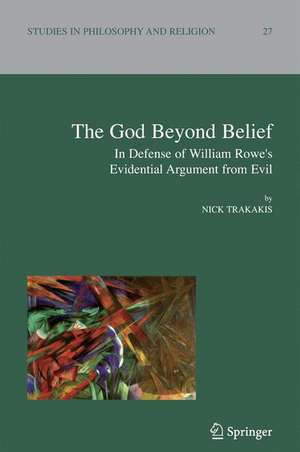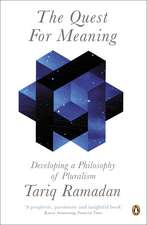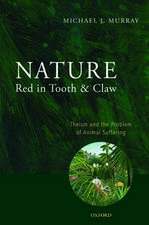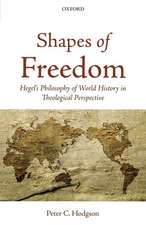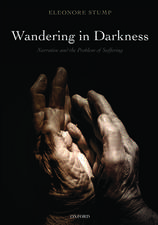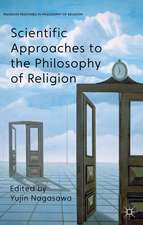The God Beyond Belief: In Defence of William Rowe's Evidential Argument from Evil: Studies in Philosophy and Religion, cartea 27
Autor Nick Trakakisen Limba Engleză Hardback – 9 noi 2006
| Toate formatele și edițiile | Preț | Express |
|---|---|---|
| Paperback (1) | 949.23 lei 6-8 săpt. | |
| SPRINGER NETHERLANDS – 30 noi 2010 | 949.23 lei 6-8 săpt. | |
| Hardback (1) | 958.56 lei 6-8 săpt. | |
| SPRINGER NETHERLANDS – 9 noi 2006 | 958.56 lei 6-8 săpt. |
Din seria Studies in Philosophy and Religion
-
 Preț: 388.72 lei
Preț: 388.72 lei -
 Preț: 383.50 lei
Preț: 383.50 lei - 15%
 Preț: 641.53 lei
Preț: 641.53 lei - 18%
 Preț: 1661.13 lei
Preț: 1661.13 lei - 15%
 Preț: 643.34 lei
Preț: 643.34 lei - 18%
 Preț: 948.79 lei
Preț: 948.79 lei - 15%
 Preț: 640.24 lei
Preț: 640.24 lei - 24%
 Preț: 791.50 lei
Preț: 791.50 lei - 18%
 Preț: 949.90 lei
Preț: 949.90 lei - 15%
 Preț: 637.93 lei
Preț: 637.93 lei - 15%
 Preț: 646.11 lei
Preț: 646.11 lei - 15%
 Preț: 637.28 lei
Preț: 637.28 lei - 15%
 Preț: 636.80 lei
Preț: 636.80 lei - 18%
 Preț: 942.31 lei
Preț: 942.31 lei - 15%
 Preț: 634.49 lei
Preț: 634.49 lei - 15%
 Preț: 637.13 lei
Preț: 637.13 lei - 15%
 Preț: 648.56 lei
Preț: 648.56 lei - 18%
 Preț: 955.25 lei
Preț: 955.25 lei - 15%
 Preț: 650.19 lei
Preț: 650.19 lei -
 Preț: 383.93 lei
Preț: 383.93 lei - 18%
 Preț: 948.29 lei
Preț: 948.29 lei - 15%
 Preț: 642.83 lei
Preț: 642.83 lei - 18%
 Preț: 947.04 lei
Preț: 947.04 lei - 18%
 Preț: 951.91 lei
Preț: 951.91 lei - 15%
 Preț: 640.24 lei
Preț: 640.24 lei - 18%
 Preț: 943.57 lei
Preț: 943.57 lei - 15%
 Preț: 641.35 lei
Preț: 641.35 lei
Preț: 958.56 lei
Preț vechi: 1168.98 lei
-18% Nou
Puncte Express: 1438
Preț estimativ în valută:
183.42€ • 192.19$ • 151.63£
183.42€ • 192.19$ • 151.63£
Carte tipărită la comandă
Livrare economică 11-25 aprilie
Preluare comenzi: 021 569.72.76
Specificații
ISBN-13: 9781402051449
ISBN-10: 1402051441
Pagini: 396
Ilustrații: XVIII, 376 p.
Dimensiuni: 155 x 235 x 21 mm
Greutate: 0.82 kg
Ediția:2007
Editura: SPRINGER NETHERLANDS
Colecția Springer
Seria Studies in Philosophy and Religion
Locul publicării:Dordrecht, Netherlands
ISBN-10: 1402051441
Pagini: 396
Ilustrații: XVIII, 376 p.
Dimensiuni: 155 x 235 x 21 mm
Greutate: 0.82 kg
Ediția:2007
Editura: SPRINGER NETHERLANDS
Colecția Springer
Seria Studies in Philosophy and Religion
Locul publicării:Dordrecht, Netherlands
Public țintă
Professional/practitionerCuprins
Background to the Problem of Evil.- Rowe's Evidential Arguments from Evil.- What No Eye Has Seen: The Epistemic Foundations of Wykstra's CORNEA Critique.- CORNEA Applied to Rowe's Evidential Argument.- Further Objections to Rowe's Noseeum Assumption.- In Support of the Inference from Inscrutable to Pointless Evil.- The Problem of Divine Hiddenness.- Meta-Theodicy: Adequacy Conditions for Theodicy.- Theodicy Proper, or Casting Light on the Ways of God: Horrendous Moral Evil.- Theodicies for Natural Evil.- The Compatibility of Gratuitous Evil with Theism.- Conclusion: Is Rowe's Evidential Argument Successful?.
Textul de pe ultima copertă
Why would a loving God who is all-powerful and all-knowing create a world like ours which is marred by all manner of evil, suffering and injustice? This question has come to be known as ‘the problem of evil’ and has troubled both ordinary folk and specialist philosophers and theologians for centuries, with no answer seemingly in sight.
However, in a series of publications from the late 1970s onwards, Professor William Rowe – one of the leading philosophers of religion today – has put forward a powerful case in support of the view that the horrors littering our planet constitute strong evidence against the existence of God. In this book, the first extended study of Rowe’s defense of atheism on the basis of evil, Nick Trakakis comprehensively assesses the large body of literature that has developed in response to Rowe’s work, paying particular attention to two strategies employed by critics: firstly, the appeal to mystery – the idea that God may well have reasons for permitting evil that lie beyond our comprehension; and secondly, the appeal to theodicies, where this involves offering explanations as to why God allows evil to abound in his creation (free will theodicies, for example, argue that God could not prevent us from acting wrongly without at the same time curtailing or removing our free will). Trakakis unearths significant difficulties in both strategies, and concludes that – absent any evidence in support of theism – the God of theism must be judged to be "beyond belief".
However, in a series of publications from the late 1970s onwards, Professor William Rowe – one of the leading philosophers of religion today – has put forward a powerful case in support of the view that the horrors littering our planet constitute strong evidence against the existence of God. In this book, the first extended study of Rowe’s defense of atheism on the basis of evil, Nick Trakakis comprehensively assesses the large body of literature that has developed in response to Rowe’s work, paying particular attention to two strategies employed by critics: firstly, the appeal to mystery – the idea that God may well have reasons for permitting evil that lie beyond our comprehension; and secondly, the appeal to theodicies, where this involves offering explanations as to why God allows evil to abound in his creation (free will theodicies, for example, argue that God could not prevent us from acting wrongly without at the same time curtailing or removing our free will). Trakakis unearths significant difficulties in both strategies, and concludes that – absent any evidence in support of theism – the God of theism must be judged to be "beyond belief".
Caracteristici
Provides the most comprehensive examination to date of the work of William Rowe on the problem of evil Is informed by an impressive breadth of research, critically engaging with the voluminous literature on the problem of evil that has been produced in the last few decades Advances a novel and controversial approach to the problem of ‘natural evil’, i.e. suffering brought about by natural forces such as hurricanes and tsunamis Written in a lively and accessible style, but without foregoing precise and rigorous argumentation
